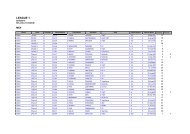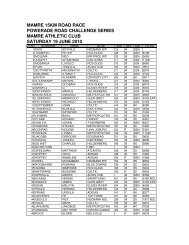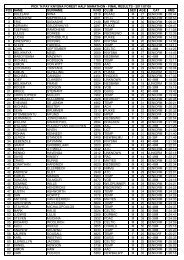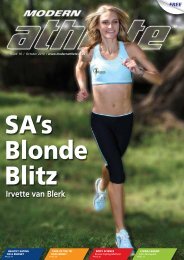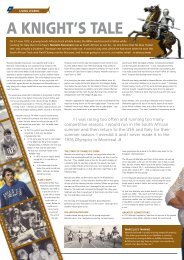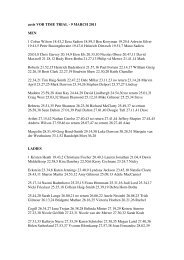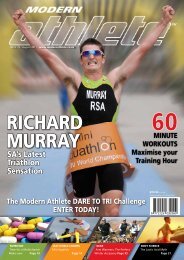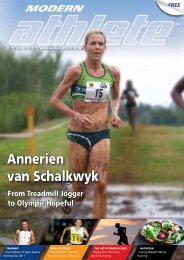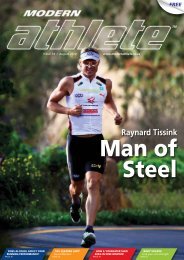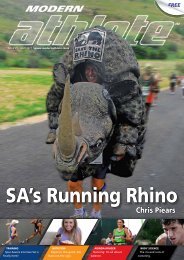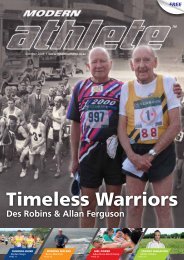Ryan Sandes - This will soon be the new home of the domain ...
Ryan Sandes - This will soon be the new home of the domain ...
Ryan Sandes - This will soon be the new home of the domain ...
You also want an ePaper? Increase the reach of your titles
YUMPU automatically turns print PDFs into web optimized ePapers that Google loves.
Image: Nick Muzik - www.nickmuzik.com<br />
jungle to assist with <strong>the</strong> quickest route out <strong>of</strong> <strong>the</strong> jungle should<br />
someone <strong>be</strong> evacuated. The military firemen sweep each stage<br />
<strong>of</strong> <strong>the</strong> race one day in advance to double check for potential<br />
dangers. Although great navigational skills are not a prerequisite<br />
to compete in this race, common sense is. The route winds<br />
along pre-existing paths, on trails and tracks through primary<br />
jungle and around and through natural obstacles such as streams<br />
and rivers.<br />
KISS YOUR COMFORTS GOODBYE<br />
The Jungle is an unforgiving place where <strong>the</strong> wea<strong>the</strong>r can change<br />
from sizzling heat to pouring rain within minutes. Competitors<br />
have to carry all <strong>the</strong>ir own equipment and food and are only<br />
provided with water. “The humidity in <strong>the</strong> Jungle is about 97%<br />
and <strong>the</strong> temperatures range <strong>be</strong>tween 30°C and 40°C. You also<br />
have to <strong>be</strong> extremely careful <strong>of</strong> <strong>the</strong> terrain, as it is easy to hurt<br />
yourself by stepping into a hole covered by vegetation or leaves,”<br />
says <strong>Ryan</strong>.<br />
On arrival in Santarém, a city in <strong>the</strong> state <strong>of</strong> Pará, competitors<br />
are transferred by boat to <strong>the</strong> village <strong>of</strong> Alter do Chão. They <strong>the</strong>n<br />
depart for an overnight trip on a boat to <strong>the</strong> Jungle base camp<br />
at Itapuama. “The journey on <strong>the</strong> boat is about eight hours and<br />
I hear it is quite crammed <strong>be</strong>cause everyone has to pitch <strong>the</strong>ir<br />
hammocks and sleep on <strong>the</strong> boat,” says <strong>Ryan</strong>.<br />
// The Jungle is an unforgiving place where <strong>the</strong><br />
wea<strong>the</strong>r can change from sizzling heat to pouring rain<br />
within minutes. //<br />
Image: Ian Taylor/RacingThePlanet Limited<br />
TRAINING AND GEAR<br />
The local jungle guides who help with trail preparation, as well<br />
as <strong>the</strong> military and fire service support teams, cover <strong>the</strong>ir arms,<br />
legs and heads when <strong>the</strong>y are in <strong>the</strong> jungle <strong>be</strong>cause <strong>of</strong> <strong>the</strong> plants<br />
that can cut skin. If you don’t cover your skin, you are also more<br />
likely to get ticks as you cross swamps. But <strong>the</strong> scariest thought<br />
<strong>of</strong> all is that you have less protection against snake bites if <strong>the</strong>re<br />
are no layers <strong>be</strong>tween <strong>the</strong> Jungle and your skin. Some even<br />
recommend snake guards that protect <strong>the</strong> legs from just <strong>be</strong>low<br />
<strong>the</strong> knee to <strong>the</strong> top <strong>of</strong> <strong>the</strong> feet. Though snakes are not predators,<br />
<strong>the</strong>y <strong>will</strong> attack when stepped on. “I decided against <strong>the</strong> snake<br />
guards. It looks too uncomfortable. I normally wear compression<br />
tights, but for this race I <strong>will</strong> wear full length tights to protect<br />
myself against scrapes and cuts,” says <strong>Ryan</strong>. He is also looking<br />
at ways to protect his feet from getting wet and while training,<br />
he deli<strong>be</strong>rately runs through wet puddles to get his feet used to<br />
possible wetness.<br />
<strong>Ryan</strong>’s backpack weighs about 9kg. Competitors need to <strong>be</strong><br />
totally self-sufficient and take <strong>the</strong>ir own hammocks and some<br />
type <strong>of</strong> covering to keep warm at night when <strong>the</strong>y sleep at<br />
campsites along <strong>the</strong> shores <strong>of</strong> <strong>the</strong> river. Like all o<strong>the</strong>r competitors,<br />
<strong>Ryan</strong> had to undergo a full medical examination as part <strong>of</strong> <strong>the</strong><br />
entry process. He is planning to leave a week <strong>be</strong>fore <strong>the</strong> start <strong>of</strong><br />
<strong>the</strong> race in order to acclimatise.<br />
<strong>Ryan</strong> normally trains in a three to four week cycle, starting<br />
<strong>of</strong>f with an easy week which builds up to a difficult week.<br />
His average weekly programme for big races includes:<br />
Monday: Gym in <strong>the</strong> evening and sauna afterwards.<br />
Tuesday: Run for 15km to 25km including running in<br />
an environmental cham<strong>be</strong>r at <strong>the</strong> Sports<br />
Science Institute <strong>of</strong> South Africa (one hour on<br />
<strong>the</strong> road and 40 to 60 minutes in <strong>the</strong> cham<strong>be</strong>r).<br />
Wednesday: Run two to three hours on trails/mountains<br />
(with backpack).<br />
Thursday: Run for 15km to 25km including running in<br />
environmental cham<strong>be</strong>r (one hour on road and<br />
40 to 60 minutes in <strong>the</strong> cham<strong>be</strong>r).<br />
Friday: Gym.<br />
Saturday: Three to nine hour run on trails/mountains<br />
(with backpack).<br />
Sunday: Three to five hour run on trails/mountains<br />
(with backpack) followed by gym and sauna.<br />
<strong>Ryan</strong> trains on trails around Hout Bay, Table Mountain, Cape Point and on <strong>the</strong><br />
<strong>be</strong>ach. He usually runs alone, but sometimes he has a buddy who joins him<br />
for two hours <strong>of</strong> his long run. “I get bored running on <strong>the</strong> road, but on trails<br />
it seems as if things get a lot clearer. Halfway through a six hour run, a lot <strong>of</strong><br />
things clear up in my head. The only bad thing about running so much is that<br />
my social life has gone downhill!”<br />
In <strong>the</strong> months leading up to <strong>the</strong> Jungle Marathon, <strong>Ryan</strong> has added a lot<br />
<strong>of</strong> gym work to his routine in order to streng<strong>the</strong>n his body. Training in<br />
<strong>the</strong> environmental cham<strong>be</strong>r has also helped him. He runs on a treadmill<br />
in <strong>the</strong> cham<strong>be</strong>r where one can control <strong>the</strong> heat and humidity. He<br />
sometimes pushes <strong>the</strong> heat up to 43°C and <strong>the</strong> humidity to 40%.<br />
“I would love to win <strong>the</strong> Jungle Marathon. That’s <strong>the</strong> <strong>be</strong>st case<br />
scenario, but I would <strong>be</strong> naïve to think I can just go out <strong>the</strong>re<br />
and win it on my first try. My goal is to try and finish it as quickly<br />
as possible, but anything can happen. You could <strong>be</strong> bitten by<br />
a snake and apparently <strong>the</strong>re are giant rats and wild pigs to<br />
negotiate. If I see <strong>the</strong>m, I <strong>will</strong> probably climb up a tree,” says<br />
<strong>Ryan</strong>, who admits he is terrified <strong>of</strong> snakes. He has woken<br />
up a few times in <strong>the</strong> last couple <strong>of</strong> weeks leading up<br />
STAGES OF THE JUNGLE MARATHON<br />
The stage distances are approximately as<br />
follows, but are subject to change<br />
Stage 1: Departs 07:00 -16.3km - cut-<strong>of</strong>f<br />
17:30<br />
Stage 2: Departs 06:00 - 24.5km - cut-<strong>of</strong>f<br />
17:30<br />
Stage 3: Departs 06:00 - 31.1km - cut-<strong>of</strong>f<br />
17:30<br />
Stage 4: Departs 07:30 - 18.4km - cut-<strong>of</strong>f<br />
17:30 (End <strong>of</strong> 100km race)<br />
Stage 5: Departs 05:30 - 87km (<strong>This</strong> is a<br />
non-stop overnight stage) - cut <strong>of</strong>f at<br />
19:00 on second day <strong>of</strong> stage<br />
Stage 6: Departs 08:00 - 24.8km - cut-<strong>of</strong>f<br />
17:00 (End <strong>of</strong> 200km race)<br />
Image: Wouter Kingma/RacingThePlanet Limited<br />
7



